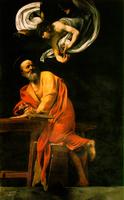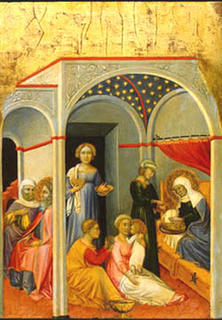Homily for the Twenty-Sixth Sunday in Ordinary Time, Year A
Today’s First Reading and Gospel both speak quite strongly of repentance – of reforming and changing our lives in response to Jesus Christ. Repentance is difficult; repentance is challenging, but it is an absolute requirement for a relationship with God, and an absolute requirement for the Kingdom of Heaven.
What is repentance? Simply put: change. The Greek word used in the New Testament is metanoia – change of heart, or change of mind.
This isn’t change for the sake of change, however. We turn our hearts and our minds – our lives – from sin and back to God, to our Heavenly Father, His Son our Lord Jesus Christ, in the power of the Holy Spirit. We turn from the path of sin and selfishness to life in Christ, life lived at the service of the Gospel.
Most of us are already “good people.” The scribes and Pharisees were “good people,” too. We, like them, are not terrorists, murderers, rapists, or thieves; we aren’t tax collectors or prostitutes, either. But Jesus declares that tax collectors and prostitutes will enter the Kingdom before us. Why?
They are not saved because of the sins they have committed – but rather because they have repented. They heard the call of John the Baptist and of our Lord and turned from the path of sin. They “changed their minds” and changed their hearts, believing in the Gospel – believing in the forgiveness offered by Jesus Christ through the mystery of His Cross.
Repentance can be tricky business: we can be offended when we’re called to abandon a way of sinful behavior; we feel the Church judging us or condemning us, instead of being lifted by Christ to the throne of Grace. So as we start to talk about repentance, open your hearts to grace, don’t be hardened to the hidden areas of sin in your life, and “change your minds” to put on the mind of Christ.
Who among us needs to repent today? I do. If you look to your right or your left, you’ll see someone who needs repentance. But that’s not where repentance begins. It begins with me. Who needs to repent? I do. Turning from sin – admitting my guilt before God, and asking Him to forgive me – is the beginning of the Spiritual Life. Until I repent of sin, over and over again, recognizing that I cannot accomplish sanctity without grace, I will never really live the Christian life. Every bit of my “good works,” every ministry I perform, every prayer I utter will be tainted with pride, as I resist the conversion required by Jesus.
But now that each of us has admitted that I need to repent, don’t answer the next question out-loud. “For what do I need to repent?” We can start with the commandments.
Is something else a false-god in my life? Is it money, entertainment, fashion, work? Do I take the Lord’s Name in vain? Am I conscious about the language I use? Do I keep Sundays holy? Do I attend Mass every Sunday? Do I shop and do other work on Sunday, or is it truly a day of rest? Do I come to Mass early enough to prepare for the greatest prayer in the world; am I distracted at Mass, waiting eagerly until it ends? I need to repent.
Do I honor my parents, my grandparents, and authority figures? Have I abandoned relatives to a nursing home? Do I obey my parents? Do I do what I’m told, without grumbling? I need to repent.
Have I killed someone? Not with a gun or knife, but with my words? Am I angry, treating people as obstacles, instead of brothers and sisters? Do I kill reputations, or kill the joy of my family, friends, neighbors? Have I used drugs? Have I abused alcohol? I need to repent.
I might not have committed physical adultery, but do I desire others outside my marriage? Am I committed to my marriage? Have I used pornography – images or stories? Does this lead me into other sexual sin? With myself or others? Do I respect marriage? Have I gone “too far” with a boyfriend or girlfriend, not respecting the virtue of chastity? Is there some other “unredeemed” area of my sexuality? I need to repent.
Do material things rule my life? Do I desire the gifts instead of the Giver? Am I upset or depressed when others have material success? I need to repent.
Am I truthful? Does lying come easily to my lips? I need to repent.
How do I repent? Come back to the Sacrament of Penance. It’s simple: in speaking to the priest, our Lord Jesus Christ hears, and through His priest, forgives our sins. Open your hearts; repent, and live the life of the Gospel.
What then? Then, turning from sin – changing our minds and hearts – we can put on the mind of Christ, “who, though He was in the form of God, He did not grasp at equality with God, but he emptied Himself; taking the form of a slave, He was found human in appearance, and being of human likeness, He humbled himself, obediently accepting even death, death on a cross. Because of this, God highly exalted Him, bestowing upon Him the name which is above every other name, so that at the name of Jesus, every knee must bend in heaven, and on earth, and under the earth, and every tongue proclaim that Jesus Christ is Lord, to the Glory of God the Father.”



